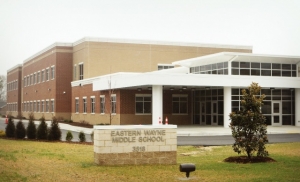Bill would give control of school facilities to county commissioners
By Steve Herring
Published in News on March 19, 2013 1:46 PM

News-Argus/MICHAEL BETTS
Eastern Wayne Middle School, above, recently underwent extensive renovations and additions. Under a bill filed in the Legislature, county commissioners would assume responsibility for all school facilities. But the state School Boards Association and the Wayne County Board of Education are not sure that it's a good idea.
A state Senate bill that would allow county commissioners statewide the option to seize control of all school facilities was barely mentioned during a Friday meeting between the Wayne County Board of Education and Board of Commissioners.
The two-hour meeting was held to talk about the school system's 2007 facilities plan.
Introduced by Republican legislators, Senate Bill 236 has passed its first reading and was referred to the Committee on Education/Higher Education. It also gives commissioners the option to assume the responsibility for school construction as well.
Wayne County School Board Chairman John Grantham has said he opposes the bill, which the state School Boards Association has called a "bad idea."
"I have heard about it, and obviously our board is opposed to it," Grantham said. "I think most school boards are. I am not sure, but I think part of it came from something to do with being able to obtain financing. That is really not applicable to anything that we are doing right now.
"We have discussed it a little bit, not as a board, but in general conversation, and I don't think anyone is for it. I don't think our commissioners are in favor of it because there is a lot that goes with it."
Commission Chairman Steve Keen refused to comment on the proposed legislation and whether the county commission supports or opposes the bill.
The state School Boards Association has been sending out a resolution to local school boards asking them to oppose the bill.
The proposed legislation was among a multitude of legislative goals adopted earlier this year by the state Association of County Commissioners.
Wayne County commissioners unanimously approved a resolution of support of the goals last month, but have not discussed the school bill itself.
Supporters of the measure say they are concerned about liability.
Counties are exempt from sales tax, schools are not. To save the sales tax during a construction project, a school board deeds the property to the county. In turn, the county leases the property back to the school system.
Once the project is completed, the county deeds the property back to the school system.
Wayne County has used that method on several occasions, most recently on the Eastern Wayne and Norwayne middle school projects.
Grantham said he believes the system has worked well.
However, supporters of the bill argue that the practice creates a liability that affects a county's ability to sell bonds, said Leanne Winner, North Carolina School Boards Association director of government relations.
That argument doesn't' hold up, she said. For example, it hasn't proven a problem in Wake County, where school construction bonds have been successfully used, she pointed out.
"I don't think that it is an issue, but is being stretched into one," she said.
Putting together a school design and location determines who will be attending the facility, Ms. Winner said. School buildings are specialized and have specific requirements for kindergarten and pre-kindergarten students, she said.
Also, the Individuals with Disabilities Education Act requirements are different than the Americans with Disabilities Acts rules that commissioner might be more familiar with, she said.
That is something that a school board has more experience with, Ms. Winner said.
"It is a bad idea that has been talked about for decades. There are already checks and balances since county commissioners have to approve funding."
The school boards association's resolution notes that state law vests the powers of general control and supervision of school systems in local boards of education, not county commissions.
It also points out that public school placement, design, and maintenance are "integral components of the control and supervision authority that local boards of education have been statutorily assigned."
It further adds that to maximize efficiency and maintain supervisory powers, local school boards must continue to control basic powers of school property ownership and that as duly elected officers, board members must continue, "to discharge their duties and responsibilities for the citizens of North Carolina."
